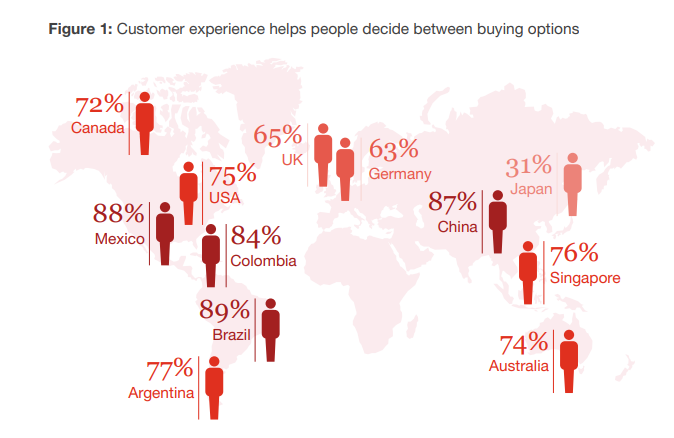“Customers may forget what you said, but they will never forget how you made them feel.”
–Horst Schulze, co-founder of the Ritz-Carlton Hotel Co.
Although the travel industry has long been hailed for its commitment to exceptional customer experiences, delivering flawless CX remains a considerable challenge, even with all the tech advancements. In this article, we will delve deeper into customer sentiments, explore strategies to enhance customer experiences, and see the role of CX in the future of travel.
Travel CX trends: Understanding the customer sentiment

According to a recent report by PWC, 73% of travelers emphasize that the pivotal factor influencing their purchasing decisions is customer experience.
Here are 5 key ways customer service influences success in the travel industry:
1 . A satisfied customer is the best business strategy!
Exceptional customer service leads to higher levels of satisfaction, increasing the likelihood of returning customer, thereby creating loyalty. A positive interaction with customer service contributes to a memorable travel experience, enhancing customer satisfaction.
2 . Reputation is everything
Customer service experiences often translate into online reviews. In the present era, it’s crucial for brands to interact with customers online. Positive reviews contribute to an enhanced reputation, attracting new customers and building trust in the brand. However, a negative experience shared by a single customer can persist on the internet, permanently impacting your reputation.
If a customer has a negative interaction, they are twice as likely to share it, than if they had a positive interaction.
3 . Retain your customers, always
Building strong relationships with customers is essential for long-term success. Excellent customer service fosters these relationships, leading to customer retention and reducing the need for extensive marketing efforts to attract new customers.
4 . Keep improving with customer feedback
Customer service interactions provide valuable feedback that travel businesses can use for continuous improvement. Understanding customer concerns helps in refining services and addressing pain points.
5. Gain a competitive advantage
In a competitive industry, outstanding customer service becomes a key differentiator. Satisfied customers are more likely to recommend a travel service to friends and family, contributing to a great competitive edge.
CX in the Future of Travel: Shaping the Future of Customer Experience in the Travel Industry
AI-enhanced customer experience is not a thing of the future, it is here, right now. But in the coming years, it is going to revolutionize the CX in the travel industry even more. Let’s delve into the role of CX in the future of travel and how you can master CX –
1 . Increased Personalization
As per McKinsey, effective personalization endeavors lead to a 20% boost in customer satisfaction, sales conversion rates, heightening client engagement and increasing revenue.
Hyper-personalization, facilitated by AI and data analytics, will empower highly customized experiences, delivering personalized recommendations, services, and itineraries aligned with individual preferences and behaviors. Understanding customer behavior and offering tailored solutions fosters stronger connections, leading customers to identify more closely with a brand and consistently choose it.
2 . Chatbots
AI chatbots play a crucial role in the CX strategy of any organization. Offering continuous availability, multilingual support, flawless, and immediate responses, chatbots contribute to cost savings for businesses. They deflect up to 90% of tickets, empowering agents to focus on handling crucial or complex queries.
In the travel sector, customers are consistently mobile and lack the time to engage in phone calls with human agents to address their inquiries. AI-based chatbots empower customers to independently resolve queries swiftly within a minimal timeframe.
3 . More focus on omnichannel customer support:
Customers are increasingly looking for effective communication channels with their travel and hospitality service providers. Kapture CX facilitates the consolidation of queries from various channels onto a unified dashboard, enabling agents to swiftly address them.
The inclusion of an omnichannel customer support dashboard ensures nothing gets missed, resulting in rapid and seamless query resolution. This, in turn, contributes to improved Average Handling Time (AHT) and Customer Satisfaction (CSAT) scores.
4 . Predictive Analytics and the power of NLP:
Natural Language Processing (NLP) enables organizations to comprehend, interpret, and address customer inquiries in a more human-like and contextually aware manner. It empowers chatbots and virtual assistants to engage in meaningful, natural conversations with customers, significantly elevating the quality of the overall support experience. NLP also facilitates sentiment analysis, allowing companies to understand customer emotions and tailor responses accordingly.
Through the analysis of historical data and patterns in customer behavior, businesses can anticipate issues proactively, personalize support, and make informed decisions based on data. This not only enhances customer satisfaction but also streamlines operations by reducing support requests and optimizing resource allocation.
As technology continues to advance and customer expectations rise, travel companies must adapt, innovate, and understand the role of CX in the future of travel to stay ahead of the curve.
By embracing personalization, connectivity, emerging technologies, customer feedback, etc., the travel industry can create a future where every journey is not just a destination but a uniquely memorable experience.
Talk to our product squad: Schedule a demo today!












